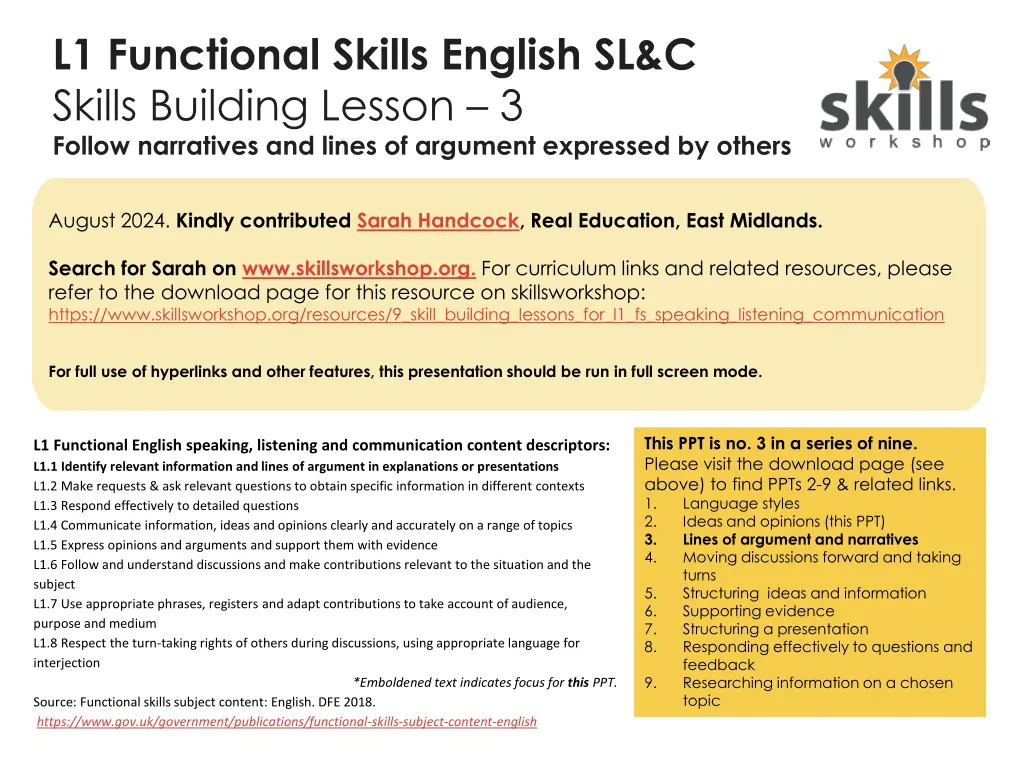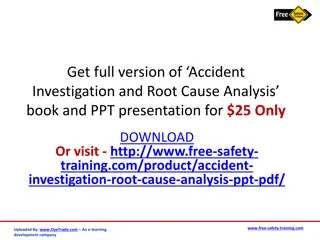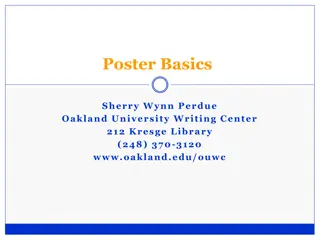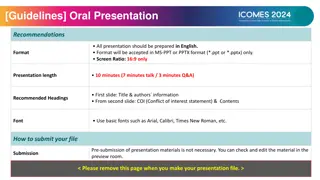
Understanding Lines of Argument and Narratives in Communication
Explore the concepts of lines of argument and narratives in communication to understand and follow others' viewpoints effectively. Learn about key vocabulary and essential skills for engaging in discussions and presentations. Enhance your ability to express opinions, support arguments, and analyze different perspectives.
Download Presentation

Please find below an Image/Link to download the presentation.
The content on the website is provided AS IS for your information and personal use only. It may not be sold, licensed, or shared on other websites without obtaining consent from the author. If you encounter any issues during the download, it is possible that the publisher has removed the file from their server.
You are allowed to download the files provided on this website for personal or commercial use, subject to the condition that they are used lawfully. All files are the property of their respective owners.
The content on the website is provided AS IS for your information and personal use only. It may not be sold, licensed, or shared on other websites without obtaining consent from the author.
E N D
Presentation Transcript
L1 Functional Skills English SL&C Skills Building Lesson 3 Follow narratives and lines of argument expressed by others Description: swlogo August 2024. Kindly contributed Sarah Handcock, Real Education, East Midlands. Search for Sarah on www.skillsworkshop.org. For curriculum links and related resources, please refer to the download page for this resource on skillsworkshop: https://www.skillsworkshop.org/resources/9_skill_building_lessons_for_l1_fs_speaking_listening_communication For full use of hyperlinks and other features, this presentation should be run in full screen mode. This PPT is no. 3 in a series of nine. Please visit the download page (see above) to find PPTs 2-9 & related links. 1. Language styles 2. Ideas and opinions (this PPT) 3. Lines of argument and narratives 4. Moving discussions forward and taking turns 5. Structuring ideas and information 6. Supporting evidence 7. Structuring a presentation 8. Responding effectively to questions and feedback 9. Researching information on a chosen topic L1 Functional English speaking, listening and communication content descriptors: L1.1 Identify relevant information and lines of argument in explanations or presentations L1.2 Make requests & ask relevant questions to obtain specific information in different contexts L1.3 Respond effectively to detailed questions L1.4 Communicate information, ideas and opinions clearly and accurately on a range of topics L1.5 Express opinions and arguments and support them with evidence L1.6 Follow and understand discussions and make contributions relevant to the situation and the subject L1.7 Use appropriate phrases, registers and adapt contributions to take account of audience, purpose and medium L1.8 Respect the turn-taking rights of others during discussions, using appropriate language for interjection *Emboldened text indicates focus for this PPT. Source: Functional skills subject content: English. DFE 2018. https://www.gov.uk/government/publications/functional-skills-subject-content-english
Functional Skills Level 1 Speaking and Listening Learning Objective: understand how to follow lines of argument and narratives expressed by others Last lesson recap: when deciding what type of language you should use in a conversation, which two things are important to consider about the situation?
Key Vocabulary Check you understand: line of argument narrative understanding research argument view point question response evidence
It is important in this unit for you to be able to understand other people s viewpoints and follow their lines of argument and narratives. What is a line of argument? The line of argument of a writer or speaker is the reasoning used to support their idea and opinions. What is a narrative? a spoken or written account of connected events; a story. Source: Google English Dictionary provided by Oxford Languages. https://languages.oup.com/google-dictionary-en
In todays lesson, we are going to focus on exploring other people s ideas and opinions and try to follow and understand what they have said. ***Link back to last lesson: last lesson, we talked about the topics of social media and veganism. Today, we are going to build on this by looking at what some other people have to say about these topics.
What does Katanu Mbevi think about social media? Watch this video and answer the questions. Impact of social media on Youth The Impact of Social Media on Youth . YouTube. Katanu Mbevi | TEDxYouth@BrookhouseSchool 2020 Make notes as you listen to the video. 1. How long does she say some young people spend on social media a day? 2. What does she think young people should use the internet for? 3. How does she say social media cause insecurity in young people? 4. What does she mean by the highlight reel ? 5. What does she mean by social currency? 6. What does she think FOMO can cause in teenagers? 7. What is the first step of her action plan? 8. How does she believe people can collaborate? 9. What is her final piece of advice?
Answers 1. How long does she say some young people spend on social media a day? 2 or more hours 2. What does she think young people should use the internet for? To build themselves to be well equipped for the future 3. How does she say social media causes insecurity in young people? Because social media is your own personal highlights reel that only shows the best part of people s lives and compares them to other people s. 4. What does she mean by the highlight reel ? The snap shots on social media of people s best moments 5. What does she mean by social currency? The likes, the comments and the shares that people want and get on social media 6. What does she think FOMO can cause in teenagers? Social anxiety that causes irrational withdrawal symptoms 7. What is the first step of her action plan? To Build a strong value system 8. How does she believe people can collaborate? By educating other people and helping people around you 9. What is her final piece of advice? Be yourself and do you - you are perfect as you are
What do you think about Katanu Mbevis views of social media? Develop your understanding: 5 minute discussion Do you think she is right that social media can cause young people to become insecure? Explain your answer. Do you think you use your social media to create a highlight reel and compare it to other people? Have you ever used social media to collaborate with other people i.e. educate yourself, get involved in a movement or raise awareness of a cause you were interested in?
Is Veganism Healthy or Harmful? Watch this video and answer the questions. The McMaster University students opinion: Is veganism healthy or harmful? Is Veganism Healthy or Harmful? . YouTube. Demystifying Medicine McMaster, 2019. Make notes as you listen to the video. 1. Why do they say vegetarian diets became popular? 2. What does a vegan diet refer to? 3. What did researchers find a vegan diet results in compared to other vegetarian diets? 4. What age did Dr Elsworth Wareham live to? 5. What disease can a vegan diet can reduce? 6. Which vitamin do they say is lacking in a vegan diet and how can you address this? 7. What negative changes did Aida Retta notice after becoming vegan? 8. What positive changes did she notice?
Answers 1. Why do they say vegetarian diets became popular? Because it was recommended that people should decrease meat intake and increase fruit and vegetable intake 2. What does a vegan diet refer to? Any thing that is free of animal products 3. What did researchers find following a vegan diet will result in compared to other vegetarian diets? A greater weight loss 4. How old did Dr Elsworth live to? 104 years 5. What disease a vegan diet can reduce Cancer 6. Which vitamin do they say is lacking in a vegan diet? B12 7. What negative changes Aida Retta she notice after becoming vegan? She was hungry more often 8. What positive changes did she notice? More energy, less tired and better skin
Is Veganism Healthy or Harmful? Develop your understanding: 5 minute discussion Do you think being vegan is a healthier way to live? Would you ever consider being vegan? Explain why or why not. Do you think it would cost more to buy vegan food and would this put you off being vegan? Do you think the risks of veganism, for example vitamin deficiencies, outweigh the benefits, for example reducing the risk of cancer?
One way you can show that you understand what someone is talking to you about is by asking them questions which are relevant to what they have said. Task: Watch the video and come up with 4 questions you would ask Ross and Hugo about their experience testing the different diets. Is a vegan diet healthier than eating meat and dairy? Is a vegan diet healthier then eating meat and dairy? YouTube. BBC Reel. BBC Global, 2021.
Plenary Now it s your turn! 1. In pairs, or with your tutor if you are one to one, pick a topic from the list. 2. Pick one person who will give their ideas and opinions on the topic and try to speak for at least 2 minutes. 3. Once they have finished speaking, the other person will ask them 4 questions about what has been said. 4. Once you have done this, swap roles and repeat the process! Topics McDonald s Going to the gym Taylor Swift s music The best holiday you ve ever been on Your hobby Learning Functional Skills English Have you achieved the learning objective? To understand how to follow lines of argument and narratives expressed by others.






















